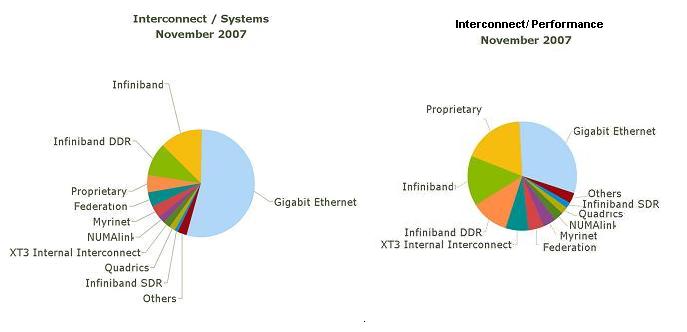CSC/ECE 506 Fall 2007/wiki4 001 a1: Difference between revisions
| Line 10: | Line 10: | ||
Ethernet is defined by IEEE Standard 802.3. It is implemented by networking protocols that allow 1GB of data to be transfered at a speed of up to 1 GB per second. 1 GB Ethernet is currently being replaced in the marketplace with the faster 10GB Ethernet. The standard defines the use of data frame collision detection rather than collision avoidance. CSMA/CD is used to describe the method Ethernet protocols allow communication. This stands for Carrier Sense Multiple Access with Collision Detection. If two stations operating Gigabit Ethernet send data frames which collide, | Ethernet is defined by IEEE Standard 802.3. It is implemented by networking protocols that allow 1GB of data to be transfered at a speed of up to 1 GB per second. 1 GB Ethernet is currently being replaced in the marketplace with the faster 10GB Ethernet. The standard defines the use of data frame collision detection rather than collision avoidance. CSMA/CD is used to describe the method Ethernet protocols allow communication. This stands for Carrier Sense Multiple Access with Collision Detection. If two stations operating Gigabit Ethernet send data frames which collide, | ||
a jam signal indicates a collision and the two sending nodes wait for a timer to expire and attempt to resend the frame. Each time a collision occurs, the timer at each node is set to a random value between 0 and 2^(k-1), where k is the number of collisions for a particular transmission. | a jam signal indicates a collision and the two sending nodes wait for a timer to expire and attempt to resend the frame. Each time a collision occurs, the timer at each node is set to a random value between 0 and 2^(k-1), where k is the number of collisions for a particular transmission. | ||
CSMA/CD shared medium Ethernet | CSMA/CD shared medium Ethernet | ||
Ethernet originally used a shared coaxial cable (the shared medium) winding around a building or campus to every attached machine. A scheme known as carrier sense multiple access with collision detection (CSMA/CD) governed the way the computers shared the channel. This scheme was simpler than the competing token ring or token bus technologies. When a computer wanted to send some information, it used the following algorithm: | Ethernet originally used a shared coaxial cable (the shared medium) winding around a building or campus to every attached machine. A scheme known as carrier sense multiple access with collision detection (CSMA/CD) governed the way the computers shared the channel. This scheme was simpler than the competing token ring or token bus technologies. When a computer wanted to send some information, it used the following algorithm: | ||
Main procedure | Main procedure | ||
1. Frame ready for transmission. | 1. Frame ready for transmission. | ||
2. Is medium idle? If not, wait until it becomes ready and wait the interframe gap period (9.6 µs in 10 Mbit/s Ethernet). | 2. Is medium idle? If not, wait until it becomes ready and wait the interframe gap period (9.6 µs in 10 Mbit/s Ethernet). | ||
| Line 24: | Line 21: | ||
Collision detected procedure | Collision detected procedure | ||
1. Continue transmission until minimum packet time is reached (jam signal) to ensure that all receivers detect the collision. | 1. Continue transmission until minimum packet time is reached (jam signal) to ensure that all receivers detect the collision. | ||
2. Increment retransmission counter | 2. Increment retransmission counter | ||
Revision as of 17:37, 24 November 2007
Current Supercomputer Interconnect Topologies
Gigabit Ethernet
Ethernet is defined by IEEE Standard 802.3. It is implemented by networking protocols that allow 1GB of data to be transfered at a speed of up to 1 GB per second. 1 GB Ethernet is currently being replaced in the marketplace with the faster 10GB Ethernet. The standard defines the use of data frame collision detection rather than collision avoidance. CSMA/CD is used to describe the method Ethernet protocols allow communication. This stands for Carrier Sense Multiple Access with Collision Detection. If two stations operating Gigabit Ethernet send data frames which collide,
a jam signal indicates a collision and the two sending nodes wait for a timer to expire and attempt to resend the frame. Each time a collision occurs, the timer at each node is set to a random value between 0 and 2^(k-1), where k is the number of collisions for a particular transmission. CSMA/CD shared medium Ethernet
Ethernet originally used a shared coaxial cable (the shared medium) winding around a building or campus to every attached machine. A scheme known as carrier sense multiple access with collision detection (CSMA/CD) governed the way the computers shared the channel. This scheme was simpler than the competing token ring or token bus technologies. When a computer wanted to send some information, it used the following algorithm:
Main procedure 1. Frame ready for transmission. 2. Is medium idle? If not, wait until it becomes ready and wait the interframe gap period (9.6 µs in 10 Mbit/s Ethernet). 3. Start transmitting. 4. Does a collision occur? If so, go to collision detected procedure. 5. Reset retransmission counters and end frame transmission.
Collision detected procedure 1. Continue transmission until minimum packet time is reached (jam signal) to ensure that all receivers detect the collision. 2. Increment retransmission counter 3. Is maximum number of transmission attempts reached? If so, abort transmission. 4. Calculate and wait random backoff period based on number of collisions. 5. Re-enter main procedure at stage 1.
Infiniband
Infiniband DDR
Federation
Myrinet
NUMAlink
XT3 Internal Interconnect
Quadrics
Infiniband SDR
Sources
[1] top500.org interconnect usage (Share %), performance statistics (Rmax Sum)
[2]IEEE 802.3 Ethernet Standard

